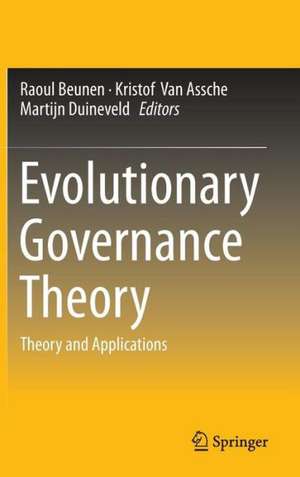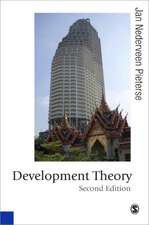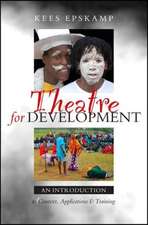Evolutionary Governance Theory: Theory and Applications
Editat de Raoul Beunen, Kristof Van Assche, Martijn Duinevelden Limba Engleză Hardback – 18 dec 2014
| Toate formatele și edițiile | Preț | Express |
|---|---|---|
| Paperback (1) | 643.48 lei 43-57 zile | |
| Springer International Publishing – 22 sep 2016 | 643.48 lei 43-57 zile | |
| Hardback (1) | 576.85 lei 38-44 zile | |
| Springer International Publishing – 18 dec 2014 | 576.85 lei 38-44 zile |
Preț: 576.85 lei
Preț vechi: 721.07 lei
-20% Nou
Puncte Express: 865
Preț estimativ în valută:
110.38€ • 115.54$ • 91.87£
110.38€ • 115.54$ • 91.87£
Carte tipărită la comandă
Livrare economică 26 martie-01 aprilie
Preluare comenzi: 021 569.72.76
Specificații
ISBN-13: 9783319122731
ISBN-10: 3319122738
Pagini: 320
Ilustrații: X, 348 p. 8 illus., 4 illus. in color.
Dimensiuni: 155 x 235 x 25 mm
Greutate: 0.68 kg
Ediția:2015
Editura: Springer International Publishing
Colecția Springer
Locul publicării:Cham, Switzerland
ISBN-10: 3319122738
Pagini: 320
Ilustrații: X, 348 p. 8 illus., 4 illus. in color.
Dimensiuni: 155 x 235 x 25 mm
Greutate: 0.68 kg
Ediția:2015
Editura: Springer International Publishing
Colecția Springer
Locul publicării:Cham, Switzerland
Public țintă
ResearchCuprins
Part I: Introduction.- Part II: Configurations of Actors and Institutions.- Part III: Configurations of Power/Knowledge.- Part IV: Case Studies.- Part V: Conclusions.- Glossary.
Notă biografică
Raoul Beunen is Assistant Professor of Environmental Governance at the Faculty of Management, Science & Technology at the Open University, Netherlands and Visiting Researcher at the Strategic Communication Group of Wageningen University. He works on Evolutionary Governance Theory in the fields of natural resource management and spatial planning. His research explores the potentials and limitations of environmental policy and planning in the perspective of adaptive governance and sustainability.
Kristof Van Assche is Associate Professor at the University of Alberta, Visiting Associate Professor in Strategic Communication, Wageningen University, and Research Fellow at ZEF/ Center for Development Research, Bonn University. He is interested in evolution and innovation in governance, with focus areas in development, environment, spatial planning and design. His work is often comparative in nature, including a fieldwork component and theoretical reflections.
Martijn Duineveld is Assistant Professor of Cultural Geography at Wageningen University. He works on Evolutionary Governance Theory in the fields of geography and urban planning. He studies the dynamics of power / knowledge and places, processes of inclusion and exclusion, object- and subject formation in Governance. He teaches on human geography, cultural geography, sustainability, landscape architecture and planning. He is active in both academic and societal debates on citizenship, planning, governance and democratization.
Kristof Van Assche is Associate Professor at the University of Alberta, Visiting Associate Professor in Strategic Communication, Wageningen University, and Research Fellow at ZEF/ Center for Development Research, Bonn University. He is interested in evolution and innovation in governance, with focus areas in development, environment, spatial planning and design. His work is often comparative in nature, including a fieldwork component and theoretical reflections.
Martijn Duineveld is Assistant Professor of Cultural Geography at Wageningen University. He works on Evolutionary Governance Theory in the fields of geography and urban planning. He studies the dynamics of power / knowledge and places, processes of inclusion and exclusion, object- and subject formation in Governance. He teaches on human geography, cultural geography, sustainability, landscape architecture and planning. He is active in both academic and societal debates on citizenship, planning, governance and democratization.
Textul de pe ultima copertă
This volume presents empirical studies and theoretical reflections on Evolutionary Governance Theory (EGT), its most important concepts and their interrelations. As a novel theory of governance, EGT understands governance as radically evolutionary, which implies that all elements of governance are subject to evolution, that these elements co-evolve and that many of them are the product of governance itself. Through this book we learn how communities understand themselves and their environment and why they create the complex structures and processes we analyze as governance paths. Authors from different disciplines develop the EGT framework further and apply it to a wide range of governance issues that cover topics such as welfare state governance, networks of power, governance of agricultural resources etc. The contributors also reflect on the possibilities and limitations of steering, intervention, management and development in a world continuously in flux. It bridges the gap between more fundamental and philosophical accounts of the social sciences and applied studies, offering theoretical advancement as well as practical recommendations.
Caracteristici
Provides an overview of Evolutionary Governance Theory (EGT) and its most important concepts Offers contributions from renowned theorists working on evolutionary understandings of governance, policy, public administration, law and development Shows how Evolutionary Governance Theory can be applied to a wide range of issues crossing academic and policy boundaries Presents a conceptual toolbox for analyzing actors, institutions, and power/knowledge Includes supplementary material: sn.pub/extras














